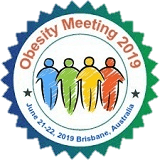
Hailey Hayes
Medical College of Wisconsin, USA
Title: Sleeve gastrectomy in obese Wistar rats improves diastolic function independent of weight loss
Biography
Biography: Hailey Hayes
Abstract
Heart Failure with Preserved Ejection Fraction (HFpEF) is the most common cause of heart failure and is characterized by impaired diastolic relaxation. Bariatric surgery significantly improves diastolic relaxation but a mechanism beyond weight loss remains unknown. In this study, the hypothesis that a Sleeve Gastrectomy (SG) will improve diastolic function independent of weight loss due to post-operative alterations in the entero-cardiac axis was tested. Male, Wistar rats were fed a High-Fat (HF) or Low-Fat (LF) diet for 10 weeks followed by SG-HF, pair-fed sham (PF-HF), ad-lib sham (AL-HF) or ad-lib LF sham surgery (n=10-14 per group). Echo cardiograms were performed pre and at eight weeks post-operatively. Left ventricular tissue was collected and analyzed for mRNA expression. While PF-HF rats weighed the same as SG-HF rats throughout the study period, only the SG cohort showed significant improvements in post-operative diastolic relaxation as measured by isovolumetric relaxation time (pre: 14.7±2.3 msec, post: 11.2±1.8 msec, p<0.05. Compared to HF-PF rats, SG-HF rats had significantly increased mRNA cardiac expression of sarco/endoplasmic reticulum Ca2+-ATPase 2a (SERCA2a) (p<0.001) and insulin-like growth factor binding protein 3 (IGFBP3) (p=0.01), while chemokine ligand 12 (CCL-12) (p=0.04) and secreted frizzled related protein 1 (SFRP1) (p=0.03) were significantly decreased. SG improves diastolic function independent of weight loss in a rat model of obesity. Further, a SG induces beneficial alterations in cardiac gene expression of multiple cardiac failure and recovery markers, including SERCA2a, IGFBP3, CCL-12 and SFRP1. The data suggests that a greater curve gastrectomy induces endocrine changes mediated by the entero-cardiac axis that reverse diastolic dysfunction independent of post-operative weight loss and could translate to extending metabolic surgery to patients with HFpEF independent of obesity status.

